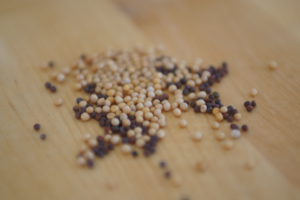
The ingredients of mustard seeds
Mustard is obtained from seeds of various types of Brassica or Sinapis. These annual herbaceous plants are mainly found in the temperate climate of Europe and Asia.
Depending on the type of mustard seed, mustard contains different ingredients. The most important of these are listed below without going into detail about their origin during production.
Oil
All cruciferous seeds, to which the mustard seeds belong from a botanical point of view, contain oil. The best known is rapeseed oil. The oil content is 25 – 35 % oil. This oil is tasteless. As it makes processing more difficult, in some processes the oil is pressed off before processing. The oil contains especially many triglycerides and erucic acid, which makes it very similar to rapeseed oil. Mustard oil has a yellow colour and especially a lot of vitamin E (tocopherol), which prevents rancidity. As long as the oil is left with the mustard seeds, it acts as an antioxidant and prevents a loss of quality due to a change in the taste of the seeds. Rancid seeds are not permitted for mustard production.
Proteins
Proteins or protein compounds are the second major ingredient group in mustard. However, they cannot be perceived by the senses. However, with mustard seeds and especially with mustard flour, they have the property of high water-binding capacity, which can be up to four times the amount, which can have a very good effect especially with mustard that is prepared too thin. Starch does not occur in mustard seeds, so that if starch is detected in mustard, it is falsified by foreign seeds or flour.
Mucilages
This mucus, which is produced by softening the epidermis, is completely tasteless and does not affect the processing in any way. It is particularly common with white or yellow mustard seeds. Brown and black seeds contain only an imperceptible amount of mucus.
Myrosinase
Is the most important substance of the mustard plant, as this enzyme releases the pungently pungent mustard oils when in contact with moisture. Without this natural enzyme mustard production would be difficult.
Sinalbine
Sinalbin is a mustard oil glucoside found in white mustard. The enzyme myrosinase cleaves sinalbine in the form of vinegar, wine or water to the ground mustard seeds, in p-hydroxybenzylsenföl and other substances when added to liquids. This substance is not volatile, which means that it cannot be smelled, but it is very sharp. A further advantage of this is that it does not disintegrate and therefore retains its sharpness even after prolonged storage. At the same time, the substance Sinalbin is also said to have a bactericidal effect, i.e. it prevents the occurrence of bacteria.
Sinigrin
Sinigrin occurs in black mustard and after cleavage with the enzyme myrosinase the substance allylsenföl is formed. This essential oil is insoluble in water and very volatile, which is why it also decreases relatively quickly in mustard. At the same time it gives the mustard a pungent smell. This mustard oil evaporates particularly easily when heated, where it is bound to water vapour. If it is to remain in mustard, it must be heated in a closed container. Pure Ally Pulse Oil is a pungent smelling, colourless liquid that stimulates tear secretion in the eyes.
Mustard can protect against cancer
Back to traditional mustard production at Fischerauer


